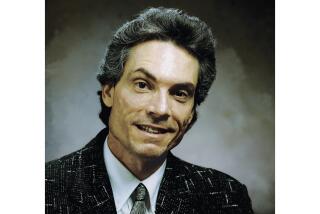DJ Dewey Phillips Is the Real Star of Music Retrospective : VARIOUS ARTISTS, “Dewey Phillips--Red Hot & Blue” <i> Memphis Archives</i> *** 1/2
One of the most famous tales in all of rock involves Memphis disc jockey Dewey Phillips’ role in the launching of Elvis Presley, but this richly entertaining album is the first chance most of us have had to actually hear Phillips’ manic radio style.
The deejay, who began hosting an R&B; show in 1952, had such a good ear for hits that Sun Records owner Sam Phillips (no relation) frequently tested his new releases on Dewey’s show.
Sam Phillips was especially excited on the night in July of 1954 when he brought to the station a copy of the first record that he had made with 19-year-old Presley--and he was anxious to test its appeal.
Unlike the normal blues or R&B; that Sam brought to the station, this record--”That’s All Right”--was an exotic mix of country and blues.
Sam Phillips didn’t have to rely on just Dewey Phillips’ opinion. The station’s phone lines were jammed so quickly by enthusiastic callers that Dewey played the record over and over, eventually bringing Elvis into the studio for an interview.
In the following years, Sam would preview several other Sun classics on Dewey’s show, including Carl Perkins’ “Blue Suede Shoes” and Jerry Lee Lewis’ “Whole Lot of Shakin’ Goin’ On.”
Unfortunately, this album doesn’t feature the Presley debut, but it’s a wildly entertaining package that offers an hour’s worth of program tapes taken from various points in a radio career that lasted from 1952 to 1964. Though the tape includes records by such artists as Piano Red, Amos Milburn and Bill Doggett, the real star of the show is the deejay himself, who delighted in talking over some of the records and singing along with others.
Eddie Dattel, the principal owner of the Memphis Archives label, said that much of the material on the album was released on vinyl in limited edition in the ‘80s, but additional material was discovered in the form of radio transcriptions at a Memphis yard sale.
Dewey Phillips’ final years in radio were apparently not happy. Plagued by personal problems and disillusioned by the commercialization of rock, he drifted from one small station to another until his death in 1968. These tapes, however, present him in all his entertaining glory, and they underscore the colorful role of disc jockeys in building an audience for this exciting new music.
Albums are rated on a scale of one star (poor), two stars (fair), three stars (good) and four stars (e x cellent).
More to Read
The biggest entertainment stories
Get our big stories about Hollywood, film, television, music, arts, culture and more right in your inbox as soon as they publish.
You may occasionally receive promotional content from the Los Angeles Times.










